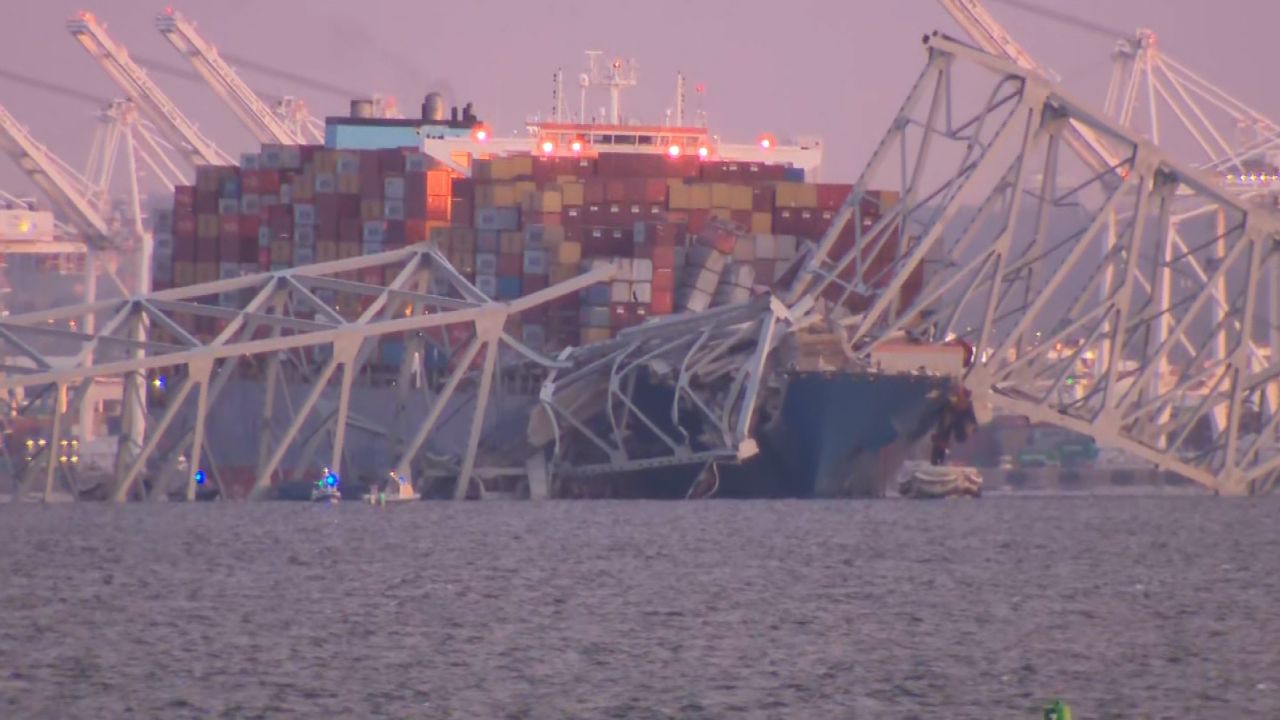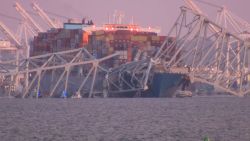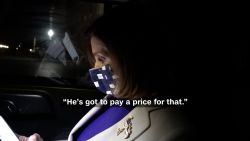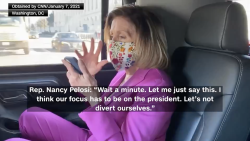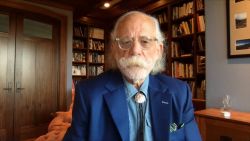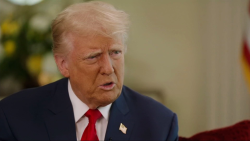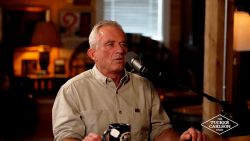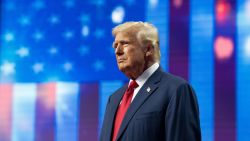Even before most Americans woke up Tuesday morning to news of the collapse of the Francis Scott Key Bridge in Baltimore, wild conspiracy theories about what supposedly had “really” happened?were running rampant online.
The claims ranged from a cyber-attack or a ship captain impaired by side effects from Covid-19 vaccines being responsible for the crash – to claims that Israel, or even the Obamas had something to do with the bridge’s collapse.
All of these claims are entirely baseless. Officials investigating the crash said early on that there was no indication it was a deliberate act.
But that didn’t stop conspiracy theories from spreading rapidly across the internet, generating tens of millions of views on social media even as dive teams crews were conducting search and rescue operations. In just a few hours an entire alternate reality, devoid of facts, had been created around the bridge’s collapse.
It is a stark reminder of the erosion of trust among Americans in major institutions, particularly government and media, and the perverse online incentive structures that reward the sharing of misinformation.
Cataclysmic events that capture the nation’s attention have always prompted a deluge of alternative theories that challenge or contradict the facts or broadly accepted version of events.
What makes this moment in American history different is the capacity for known peddlers of disinformation to immediately flood the zone with objectively false information, thanks in part to the lack of robust fact-checking operations at social media companies including Facebook and X, formerly known as Twitter.
It is entirely possibly that millions of Americans encountered false claims about the bridge collapse when they woke up Tuesday morning before ever seeing the facts.
“In many ways, the Baltimore bridge conspiracies serve as a canary in the coalmine for how election conspiracies will emerge on social media in the leadup to November,” said Ben Decker, CEO of Memetica, a company that tracks misinformation online.
The usual suspects
Soon after 7 a.m.?EST, on Tuesday, less than six hours after the bridge collapsed, Andrew Tate, an online provocateur with more than 9 million followers on X, posted, without offering a shred of evidence, that the ship had been “cyber-attacked” and was deliberately steered toward the bridge.
“Foreign agents of the USA attack digital infrastructures,” he added.
Tate, who is known for his misogynistic posts, is currently awaiting trial in Romania on charges of human trafficking and rape. After that trial he is expected to be extradited to the United Kingdom to face sex offense charges. He denies all charges.
By Wednesday, Tate’s tweet had been seen more than 18.5 million times on X, according to the company’s own data.
Under Elon Musk, X has touted community notes as a way for its community to fact-check itself. The note that showed under Tate’s tweet for some of Tuesday meekly described his statement as “speculation.” By Wednesday morning, the note was updated to state Tate’s post was “misleading.” By Wednesday evening, the note said in part that, “readers should be aware this is a personal opinion being portrayed as factual.”
Regardless, Tate’s post helped set the tone for the day’s alternate reality.
Two hours after Tate’s post, Sandy Hook conspiracy theorist Alex Jones posted the video of the bridge collapse on Tuesday and commented, “Looks deliberate to me. A cyber-attack is probable. WW3 has already started.”
Jones and other doomsday peddlers have for years tried to convince their audiences that the world is on the brink of catastrophe and that they need to prepare. Part of that preparedness involves buying thousands of dollars’ worth of freeze-dried food and survival kits – which, of course, Jones happens to sell.
‘A little bit of decency and respect’
On Wednesday, the head of Maryland State Police announced that dive teams had recovered the bodies of two people in the river. At least four other people are unaccounted for and presumed dead, the Coast Guard said.
Baltimore’s mayor asked for people to have “a little bit of decency and respect” when it comes to online discourse about the fatal bridge collapse.
“Don’t spread misinformation. Don’t play bridge engineer online or in the media. Remember that these are people’s family members who have lost their lives simply trying to make transit better for the rest of us,” Baltimore Mayor Brandon Scott said.
By then the tragedy had already become a battering ram for political posturing.
Some right-wing social media users suggested that Diversity, Equity and Inclusion (DEI) policies were linked to the bridge collapse by arguing that more qualified people were passed over for jobs to fulfill diversity and inclusion mandates and that this in some way contributed to or caused the accident.
There is zero evidence to support this claim – but it makes for a talking point that generates a lot of likes and shares. DEI programs, which promote the inclusion of people from groups that have historically been underrepresented or discriminated against, have become the latest front in America’s culture wars - with Republican states such as Florida and Texas signing into law bills that restrict these initiatives.
Politics is everything
What is perhaps most notable about how quickly and widely conspiracy theories about a breaking news story spread is just how?normal?this all is right now. The creation of a daily alternate reality is a well-oiled machine by now.
On any given day there is a solid contingent of online influencers, faux intellectuals, and self-professed “truth tellers” who will tell you whatever you are being told on the news is a lie – whether it’s who really won the 2020 election (Biden did) or if Taylor Swift has the ability to rig the Super Bowl to help President Joe Biden (she doesn’t).
Some of this mis- and disinformation is politically or ideologically motivated, some financial, some a mix of both. X under Musk has incentivized creators to make viral posts by offering them a cut of the company’s advertising revenue.?Musk claims X doesn’t pay creators whose posts have been corrected by community notes – but a lot of posts on the platform fall into a gray area.
There are other ways to cash in too – like selling doomsday survival kits.
While many Americans might laugh or shrug when they hear some of these conspiracy theories –? the daily deluge of false claims shape the world view of millions of other Americans.
A quarter of all Americans falsely believe the FBI, not Trump supporters, instigated the January 6, 2021, attack on the US Capitol. A third of Republicans believe the Taylor Swift-Super Bowl conspiracy theory.
Jewish space lasers
As news unfolded on Tuesday, the conspiracy theories continued.
Some people falsely claimed Israel was responsible. Others bizarrely, yet darkly, suggested that the Obamas might be responsible because they produced a Netflix movie where a cyberattack causes an oil tanker to run aground. “Draw your own conclusions,” one person with almost 700,000 followers on X posted Tuesday morning.
David Simon, the creator of the HBO series “The Wire” and a famed Baltimore native, began fact-checking some of the more ludicrous false claims as they circulated on X on Tuesday.
When one X user suggested the Covid-19 vaccine was to blame for the collision, because the captain of the ship had collapsed after taking the vaccine, Simon hit back with facts.
The captain of the ship did not collapse, a power outage caused the collision, Simon noted – before?he dryly, and sarcastically, suggested the X user he was replying to might believe the power outage was cause by “Jewish space lasers.”
Before becoming a member of Congress, Marjorie Taylor Greene infamously engaged with a conspiracy theory that Jewish space lasers might have been the cause of deadly wildfires in California.
On Tuesday, the Georgia Republican posted on X asking if the bridge collapse was an “intentional attack or an accident,” adding that there should be a full investigation. Greene has not weighed in on the cause of the bridge collapse.
Jewish space lasers were not responsible for the wildfires, nor the Baltimore bridge collapse. But for many Americans, even maybe some in the halls of Congress, it might not seem so far-fetched.

